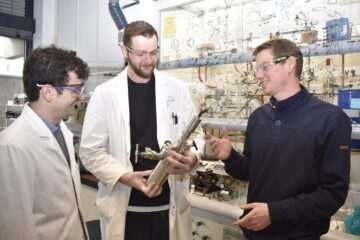New technique transforms iPS cells into natural tumor killers

A technique for producing natural killer T (NKT) cells, known for their role in suppressing tumor growth, has been successfully demonstrated for the first time using induced pluripotent stem (iPS) cells. Developed by researchers at RIKEN, Japan’s flagship research institution, the technique opens the door to effective new cell-targeted treatments for cancer.
Through their production of TH1 cytokines, NKT cells play an essential role in innate immune responses, protecting against tumors and virus-infected cells. Yet while clinical trials have shown that injection of the glycolipid á-GalCer can effectively activate an NKT cell antitumor response, most cancer patients have very few NKT cells, which has prevented the wider application of this therapy.
Induced pluripotent stem (iPS) cells, “all-purpose” cells capable of differentiating into any type of cell, present a potential solution to this shortage of NKT cells, but with a catch: in lymphocytes, rearrangement of genes during differentiation drastically diminishes the effectiveness of conventional iPS cell generation techniques, resulting in only a small portion of cells with the desired antitumor function.
To overcome this problem, the research team used mature NKT cells that had already undergone gene rearrangement to derive their iPS cells. As reported in the July issue of the Journal of Clinical Investigation, these iPS cells enabled them to generate large numbers of NKT cells that secrete abundant IFN-ã, a TH1 cytokine that activates antitumor functions. When tested using a mouse model, the cells successfully reproduced the effects of natural NKT cells and suppressed tumor growth, validating the approach and setting the stage for powerful clinical applications in cancer therapy.
For more information, please contact:
Dr. Hiroshi Watarai
Laboratory for Immune Regulation
RIKEN Research Center for Allergy and Immunology
Tel: +81-(0)45-503-7008 / Fax: +81-(0)45-503-7006
Dr. Haruhiko Koseki
Laboratory for Developmental Genetics
RIKEN Research Center for Allergy and Immunology
Tel: +81-(0)45-503-9689 / Fax: +81-(0)45-503-9688
Ms. Tomoko Ikawa (PI officer)
Global Relations Office
RIKEN
Tel: +81-(0)48-462-1225 / Fax: +81-(0)48-462-4715
Email: koho@riken.jp
Media Contact
All latest news from the category: Life Sciences and Chemistry
Articles and reports from the Life Sciences and chemistry area deal with applied and basic research into modern biology, chemistry and human medicine.
Valuable information can be found on a range of life sciences fields including bacteriology, biochemistry, bionics, bioinformatics, biophysics, biotechnology, genetics, geobotany, human biology, marine biology, microbiology, molecular biology, cellular biology, zoology, bioinorganic chemistry, microchemistry and environmental chemistry.
Newest articles

Lower dose of mpox vaccine is safe
… and generates six-week antibody response equivalent to standard regimen. Study highlights need for defined markers of mpox immunity to inform public health use. A dose-sparing intradermal mpox vaccination regimen…

Efficient, sustainable and cost-effective hybrid energy storage system for modern power grids
EU project HyFlow: Over three years of research, the consortium of the EU project HyFlow has successfully developed a highly efficient, sustainable, and cost-effective hybrid energy storage system (HESS) that…

Safer alternative for an explosive reaction
The chemical industry has been using a reaction with explosive chemicals for over 100 years – now Mülheim scientists have discovered a safer alternative. The Ritter Group of the Max…





















